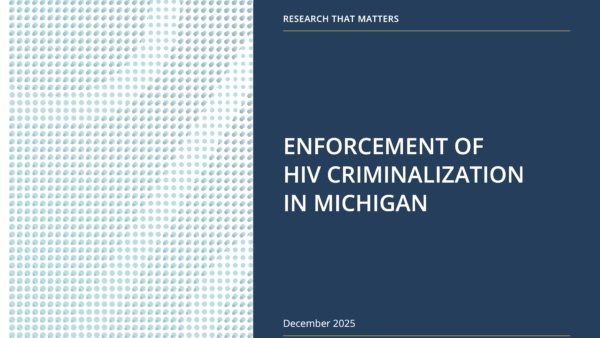People living with HIV face increased criminalisation and prosecution based on their HIV status, finds a new report by the HIV Justice Network and the Global Network of People Living with HIV (GNP+).
HIV criminalisation is the application of the criminal law to people living with HIV based solely on their HIV status. This happens through HIV-specific criminal statutes, or by applying general criminal laws that allow for prosecution of unintentional HIV transmission, potential or perceived exposure to HIV without transmission, and/or non-disclosure of known HIV-positive status.
The use of criminal laws against people with HIV impacts entire communities. It perpetuates stigma, discrimination and feelings of fear, shame and anger towards people living with HIV.
“These laws and prosecutions do not only impact the people investigated, prosecuted, or incarcerated. These laws undermine core sexual rights and public health principles. Their existence and application exacerbate racial and gender inequalities and jeopardize critical HIV prevention and service delivery efforts” says Julian Hows of GNP+.
The report, Advancing HIV Justice 2: building momentum in global advocacy against HIV finds a total of 72 countries have adopted laws that specifically allow for HIV criminalisation. In these countries laws are either HIV-specific, or name HIV as one (or more) of the diseases covered by the law. Prosecutions for HIV non-disclosure, potential or perceived exposure and/or unintentional transmission have now been reported in 61 countries.
Of particular concern is the fact that 30 sub-Saharan African countries have now enacted overly broad and/or vague HIV specific statues enabling legal repercussions against people living with HIV. The report shows the highest number of prosecutions are being reported in Russia, the United States, Belarus and Canada.
The trend is in contrast with the latest science which shows that people with HIV who adhere to HIV treatment and have an undetectable viral load are not infectious. In addition this approach of the criminal law violates key legal and human rights principles.
HIV criminalisation does not exist in vacuum. It is often linked to punitive laws and policies that impact sexual and reproductive health and rights, especially those aimed at sex workers, current and former drug users (particularly people living with hepatitis C), transgender people and/or men who have sex with men and other sexual minorities.
Click here to read the new report and visit the HIV Justice Network for more information on how you can get involved in the movement to eliminate HIV – or modernise – HIV criminalisation laws.









